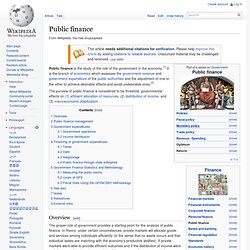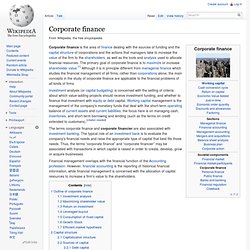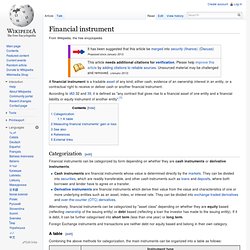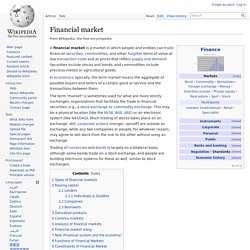

Finance. Areas of finance[edit] Personal finance[edit] Questions in personal finance revolve around Protection against unforeseen personal events, as well as events in the wider economyTransference of family across generations (bequests and inheritance)Effects of tax policies (tax subsidies and/or penalties) on management of personal financesEffects of credit on individual financial standingPlanning a secure financial future in an environment of economic instability Personal finance may involve paying for education, financing durable goods such as real estate and cars, buying insurance, e.g. health and property insurance, investing and saving for retirement.

Personal finance may also involve paying for a loan, or debt obligations. Financial position: is concerned with understanding the personal resources available by examining net worth and household cash flow. Corporate finance[edit] Financial management overlaps with the financial function of the Accounting profession. Public finance. Public finance is the study of the role of the government in the economy.[1] It is the branch of economics which assesses the government revenue and government expenditure of the public authorities and the adjustment of one or the other to achieve desirable effects and avoid undesirable ones.[2] The purview of public finance is considered to be threefold: governmental effects on (1) efficient allocation of resources, (2) distribution of income, and (3) macroeconomic stabilization.

Overview[edit] The proper role of government provides a starting point for the analysis of public finance. In theory, under certain circumstances, private markets will allocate goods and services among individuals efficiently (in the sense that no waste occurs and that individual tastes are matching with the economy's productive abilities). If private markets were able to provide efficient outcomes and if the distribution of income were socially acceptable, then there would be little or no scope for government. Personal finance. Personal financial planning process[edit] The key component of personal finance is financial planning, which is a dynamic process that requires regular monitoring and reevaluation.

In general, it involves five steps:[2] Typical goals most adults and young adults have are paying off credit card and/or student loan debt, investing for retirement, investing for college costs for children, paying medical expenses, and planning for passing on their property to their heirs (which is known as estate planning). [citation needed] Areas of focus[edit] The six key areas of personal financial planning, as suggested by the Financial Planning Standards Board, are:[3] Financial position: is concerned with understanding the personal resources available by examining net worth and household cash flow. Corporate finance. Investment analysis (or capital budgeting) is concerned with the setting of criteria about which value-adding projects should receive investment funding, and whether to finance that investment with equity or debt capital.

Working capital management is the management of the company's monetary funds that deal with the short-term operating balance of current assets and current liabilities; the focus here is on managing cash, inventories, and short-term borrowing and lending (such as the terms on credit extended to customers). [citation needed] The terms corporate finance and corporate financier are also associated with investment banking. The typical role of an investment bank is to evaluate the company's financial needs and raise the appropriate type of capital that best fits those needs. Thus, the terms “corporate finance” and “corporate financier” may be associated with transactions in which capital is raised in order to create, develop, grow or acquire businesses.
Financial instrument. A financial instrument is a tradable asset of any kind; either cash, evidence of an ownership interest in an entity, or a contractual right to receive or deliver cash or another financial instrument.

According to IAS 32 and 39, it is defined as "any contract that gives rise to a financial asset of one entity and a financial liability or equity instrument of another entity".[1] Categorization[edit] Financial instruments can be categorized by form depending on whether they are cash instruments or derivative instruments: Alternatively, financial instruments can be categorized by "asset class" depending on whether they are equity based (reflecting ownership of the issuing entity) or debt based (reflecting a loan the investor has made to the issuing entity). If it is debt, it can be further categorised into short term (less than one year) or long term. Foreign Exchange instruments and transactions are neither debt nor equity based and belong in their own category.
A table[edit] Financial market. In economics, typically, the term market means the aggregate of possible buyers and sellers of a certain good or service and the transactions between them.

The term "market" is sometimes used for what are more strictly exchanges, organizations that facilitate the trade in financial securities, e.g., a stock exchange or commodity exchange. This may be a physical location (like the NYSE, BSE, NSE) or an electronic system (like NASDAQ). Much trading of stocks takes place on an exchange; still, corporate actions (merger, spinoff) are outside an exchange, while any two companies or people, for whatever reason, may agree to sell stock from the one to the other without using an exchange. Trading of currencies and bonds is largely on a bilateral basis, although some bonds trade on a stock exchange, and people are building electronic systems for these as well, similar to stock exchanges.